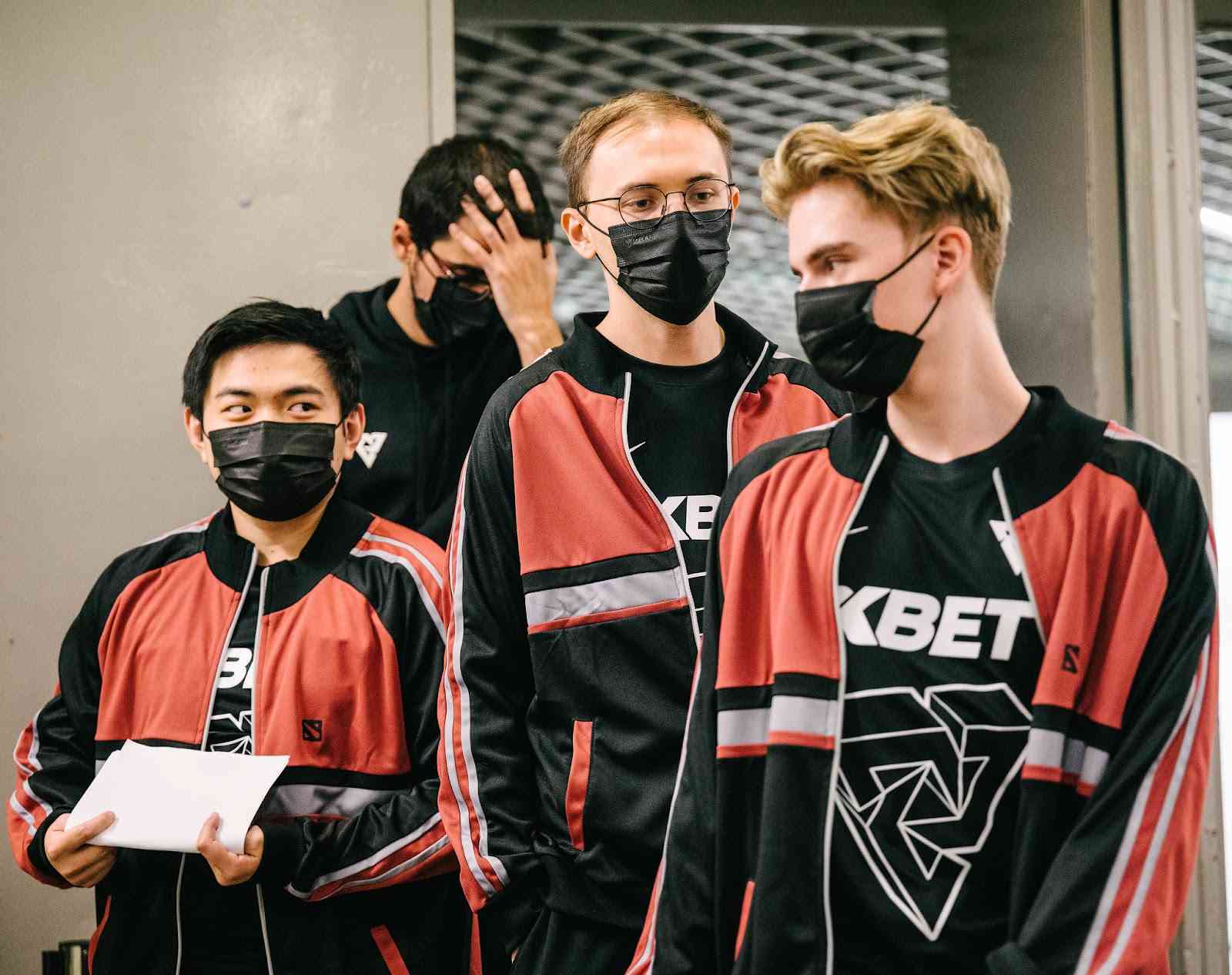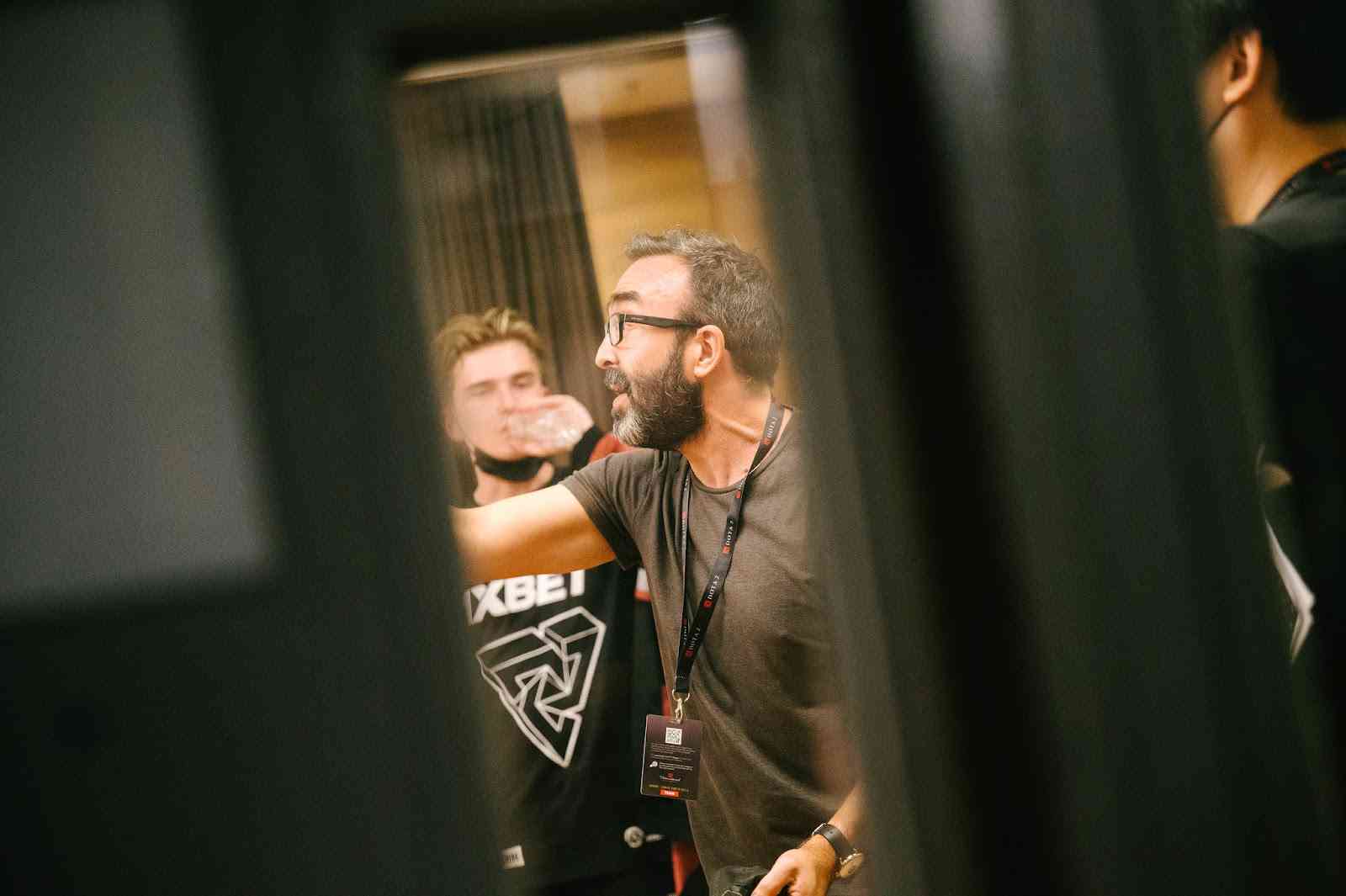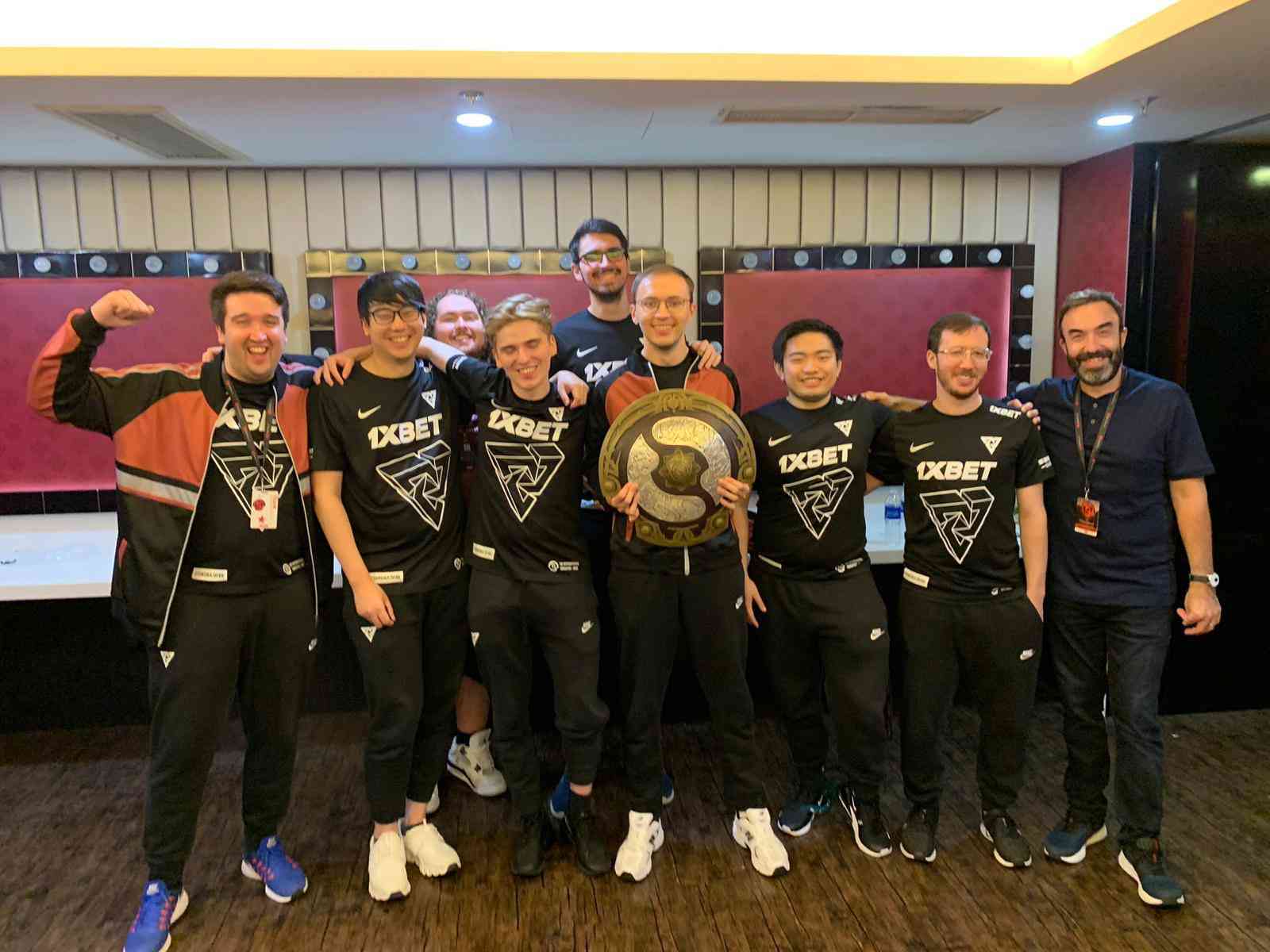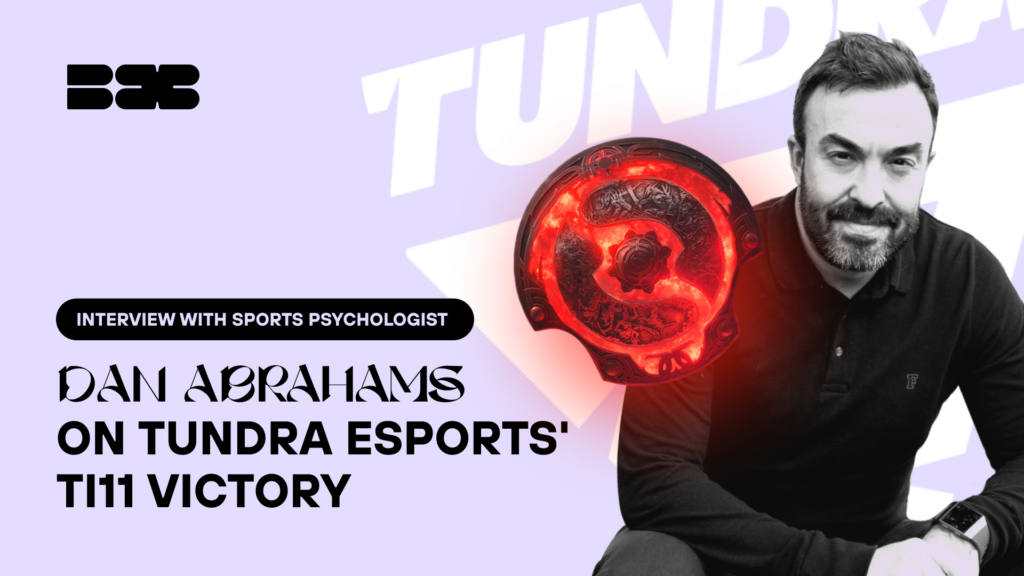In the second part of BLIX.GG’s interview with sports psychologist Dan Abrahams, he discusses how he helped Tundra Esports win The International 11 from a mental standpoint, working with head coach Kurtis’ Aui_2000’ Ling and team captain Wu ‘Sneyking’ Jingjun, and how esports is adopting sports psychology into its repertoire.
Tundra in TI11
Pedro Romero, BLIX.GG: I’ve listened to you mention on Twitter and during this conversation the five pillars that helped Tundra win the whole tournament at its end. Within that aspect, how did you implement these five pillars ahead of TI to make sure at the very least Tundra wouldn’t have the same performance that they did in Arlington?
Abrahams: Well, in a very nonlinear manner. It’s one thing writing a thread on Twitter that looks all very linear and neat and it seems like I turned up on day one. I can assure you it didn’t work in that way. It was definitely a high-performance mindset first and I usually do that because that’s the low-hanging fruit. Competitors, in any domain, need frameworks to the mental side of their game.
A lot of the narrative going into my appointment was in Sweden where they got to the semi-finals and underperformed so there was a feeling, they weren’t able to do it under pressure. That’s what I was going to start with straightaway and we started to build those structures around HPM and LPM. You can imagine the kind of topics underneath that kind of skills involved there such as focus of attention, self-control, and mental intensity. We call that ‘approach behavior’ in psychology so that was the beginning and that helps players understand they need this framework in place.
The beauty of having something like HPM and LPM is that its’ language that players can share. If I walk into a football club, I will do exactly the same thing we were talking today about HPM and LPM. You’ve got a language you can share, identify yourselves around, and can work on together. Then, as I spoke to the players, then the other things started to emerge in my mind as being important. I was always going to work with a few of them on leadership but not by ridiculous amounts around it. With the teamwork stuff, we had some good conversations around what behaviors we’ll engage in, how they relate to our team values, and what that looks like so we can create consistency whilst recognizing and understanding individual differences. We did have contestation and we did have healthy discussions and disagreements. We still want some repeatable behaviors because that makes the team. The deliberate practice was something I went into with the team so that’s the fourth pillar.
 Tundra Esports backstage during TI11
Tundra Esports backstage during TI11Tundra during TI11 (Credit: Valve)
Abrahams: We’ve got high-performance mindsets, leadership, values, and behaviors (which is basically teamwork stuff), we’ve got a deliberate practice that really drew from the generic viewpoint that esports players work harder than anybody else out there in competitive domains. But I would draw a question mark: if you’re doing this 8 – 10 hours a day, what are you processing? What are you specifically learning? You can sit on your computer but are you actually engaged with the game? Are you in your HPM in the game? What insights are you building from that practice? We spoke a bit around that and how they would build some more insights from the practice that they were doing. The final bit that came out of Arlington which was in and around the TI was having a good daily structure and that could deviate. If you’re going to have a tournament where you’re in a boot camp for two to three weeks in a different country, and most of it is done in a small room, then we need to find ways to break things up here for everybody’s sanity and prevent burnout.
By the time we came to the end of TI, the guys at Tundra were happy for me to sit down and share about what we’ve done. I can’t share everything because lots of things are proprietary but I went “when you sum it all up, these were the five pillars that we worked on.” Seasons, in any sport and esport, are messy and I wouldn’t want anybody to think “Dan came in June and said, ‘these are the things we got to work on.'” It was organic, nonlinear, messy, and chaotic but it grew by the end of the season. By the time TI finished I can go “Right, 1-2-3-4-5. These are the things we did” and give people a modicum of an idea of what it was that we were doing but not absolutely everything.
BLIX.GG: You stated in your Twitter post about Tundra’s TI11 victory there was an emphasis on working with Aui_2000 and Sneyking for TI11 in order to clearly define the team’s goals on a day-by-day basis. How did you work with those people in particular for that event?
Abrahams: I’ll tell you what I can share. The first thing to say is Kurtis is a good coach. He doesn’t have multiple years of experience as a coach but he is as knowledgeable a person and as dedicated as a person to his craft as I’ve ever seen. That’s always wonderful to work with. Sneyking has great experience so that’s wonderful to work with as well. I have a philosophy where you got to have clear leadership and it’s not that Saksa (Martin Sazdov), 33 (Neta Shapira), Nine (Leon Kirilin), or skiter (Oliver Lepko) didn’t lead. There’s a democracy there and the values and behaviors of teamwork very much promoted that team-first ethos, but you’ve still got to have clear leadership and that’s what I expressed to the guys, Kurtis and Sneyking especially, so we started to discuss how they could do that to the very best of their ability.
You can have a lot of domain-specific knowledge that Kurtis and Sneyking have but it’s on how do you deliver on that knowledge? That’s really what we did. The three of us did sessions. There’s nothing really more to add on without going into perhaps the kind of detail that I respectfully wouldn’t want to share and can’t share. Sorry to tease you slightly there but what I can share is, for me, you need good leadership structure and those leaders need to know how to lead. It’s all well saying we have a democracy but leaders still need to lead with authority. There’s a difference between being authoritative and authoritarian. You still got to be authoritative as a leader. You’ve got to communicate effectively and succinctly. You can’t be wishy-washy and fluffy with your language whilst you have to build the capacity to listen to others as well. Those are the kinds of topics that we would speak about regularly in order to help Kurtis and Sneyking be as good as they can possibly be as leaders and I think that they did that really well. There’s always room for improvement which is exciting. And I think that came out in TI. I think they led brilliantly. I think Kurtis coached brilliantly.
I have 25 years in high-performance sport. I’ve been a coach myself. I’ve worked with international and domestic level coaches. I have my own podcast, The Sports Psych Show, where we do serious deep dives into coaching theory, and I can categorically say Kurtis coached amazingly well at TI. Maybe you might listen in and say I’m being patronizing. I’m not because we’re all learning our own roles. We’re all trying to improve. He doesn’t have 10-15 years of coaching experience and I do and I thought Kurtis was outstanding as a coach in that team. Is there always room to look at different many things and improve upon? Yeah, you can improve upon that coaching and the team might get knocked out in the group stage or in the early knockout stages. There’s not a 100% correlation there but they led well and that was definitely a factor in winning TI. Kurtis’s coaching and Sneyking’s leadership as team captain, are definitely a factor.

Abrahams talking to Tundra during TI11 (Credit: Valve)
BLIX.GG: In a game such as Dota, teams must find a stringent balance between working as a singular unit and allowing players some autonomy that could give them an advantage in games. Was it difficult in your case to find that strong balance between both of those aforementioned sides?
Abrahams: I think what you’re describing there happens as a consequence of those five pillars and other stuff. I think what you’ve described is the complexity of the game and why it’s so difficult, if not impossible, to win and win again. The reality of it is in 2023, Tundra are irrespective of my involvement and what that looks et cetera. Tundra are going to lose games, you know? This is the very paradoxical nature of performance in sport: human beings are complex and sport is complicated. Thus, you can’t get too down when you lose and you can’t get too up when you win. Tundra might lose in a group stage in a Major. You’re talking about complications in the game and really it comes down to there being a great deal of uncertainty. The term we might use there, maybe in psychological or physics terms, is entropy. There’s a lot of entropy and in many respects, you could argue, that’s my role as a sports psychologist which is to reduce uncertainty. But how do we do that? Great leadership. Great leadership deals with the stuff that you’ve just described. High-performance mindsets deal with this stuff.
If you’ve got five players on the podium and they know what their HPM is, they can slot into their HPM which isn’t always easy to do. If they find themselves in LPM, they can shift back up to HPM quickly. Structure diminishes uncertainty and reduces entropy. Teamwork and deliberate practice do as well. All of those drive confidence reduce uncertainty and thus deal with the complication of the game as well as the human complexity element to it. I do wonder if whether you think about communication being meshed into all of that or hierarchically somewhere at the top of the chain there. I wonder if the five things I’ve talked about really help those players communicate effectively in the heat of the battle, and when that communication is good, subsequently your star player is able to do what he or she wants to do and other players can say, ‘Don’t go that way. I’m doing this” and the communication is so good that the star player goes “Fine.” Thus, you have greater task cohesion because you’ve got more of a shared mental model about what you’re trying to do.
Everything you lay down feeds into dealing with the complication of the game, the complexity of the human being, and the makeup of the human beings in the team essentially. I don’t really understand the game. I’m just looking at it from the perspective of are we getting gold coins and killing people and when I look at that, I know what’s going on. I picked up a few things, but what I will share is that their communication was fantastic. The complexity and complication, across the team and within the game, is dealt with by great communication and that is leaned towards covering the five things I covered and all the great stuff Kurtis did to help the team prepare. And he did much more than me, let’s be clear. I’m the “one to five” guy. I’m minimal here. It’s all Kurtis and the team, but if you don’t have that 5% in place, that could be the difference between actually winning TI or a Major and losing in the group stage.
BLIX.GG: Throughout the main event phase of the event, it seemed as though the team had nerves of steel either in matches or during interviews. I remember how, after winning the tournament in the Grand Finals, they looked nonplussed. How did you view their progression throughout the main event phase all the while they maintained that calm mindset all the way to the end?
Abrahams: Look, I want to be mindful of what I say but early in the group stages, there were some stern words. You’ve got to have good people. Again, let’s come back to contestation. Let’s come back to healthy conflict. There was some stern words at the beginning of the tournament from the right people ad I think that helped everybody. I think that all the stuff I injected in helped. I think Kurtis coached great and Sneyking led really well and subsequently, as the tournament wore on, they just continued doing the same good things and it just so happens that, as they played, the team, I think, surprised themselves. It can sometimes only be a small shift that you need to be able to deal with the kind of pressure together. However, remember that a small shift is underpinned by multiple things done over multiple months historically and enormous amount of dedication to their craft.
Abrahams: It’s like when you watch people who are amazing at things and they make it look so easy. But I do think collectively, by the end of it, when they were lifting the trophy, they were slightly surprised at how comfortable it felt. And there’s all kinds of dynamics. that isn’t there? Sometimes, you come up against an opposition that underperform. Sometimes, you find strategies that click into place and that has a knock-on effect in and of itself. Sometimes, you’ve got a couple of players who are suddenly on fire whether it’s any of the guys. I kept going back into after the games and asking our team manager “So tell me about that because I just don’t understand the game.” I need somebody to break it down a little bit for me and they would say, “Oh man, skiter was just unreal. Nine was just imperious there. He was awesome.” You will also account for individual performances sometimes. Aided by mindset, yes, but just individual performances. There’s all these elements thrown into the mix.
I suppose what I’m trying to say is it’s impossible to articulate this in a unidimensional way. There’s not one thing, but what I can say is by the end of the tournament, I think they were like “Geez. We just did everything that we dreamed doing and it actually, on this occasion, didn’t feel that hard.” I remember Saksa got interviewed straightaway by the main hosts there and he was like, “Yeah, it just kind of feels like we just played a pub.” That can come across as a bit disrespectful and Saksa is the last person on planet Earth to be disrespectful to anybody. He’s as kind and as pleasant a person as you’re going to meet so he wasn’t being that. It was just they hit a sweet spot, you know? And that might not happen again–or it might happen every time again. The causality of what we’ve been doing. It helped, it worked, and they won. On another time? It may not, you know? it just clicked into place so we all have to admit that there’s no point in saying, “Yeah! I’m a sports psychologist. I delivered this and they won subsequently. Everything Kurtis did was brilliant.” Come on, we’ve got to be more humble there. Performance is complicated and complex. It’s all in striving to do the best and it just so happens they hit that sweet spot and it felt comfortable. It might feel damn hard come January, who knows?
 Abrahams with the rest of Tundra Esports and the aegis after their win at TI 11
Abrahams with the rest of Tundra Esports and the aegis after their win at TI 11Abrahams with the rest of Tundra (Credit: Abrahams)
BLIX: How would you look back at your contribution to Tundra throughout this past DPC?
Abrahams: I just enjoyed it. I have my career to make memories for myself and hopefully for others as well in terms of helping them do well throughout their playing careers. One memory I had was I could hardly watch the thing. I was pacing up and down in a room in just about every knockout game. There were lavatories by the main room where we were watching and I was just walking up and down that little section by the toilets listening to the communication, but I could hardly watch it. I need to practice what I preach and relax a little bit more. Tundra created such a great experience for them. My contribution is minimal but important and I hope people can take that in the right way and not in an egotistical way.
Ultimately, and I draw back on one of my earlier answers, and every team is going to have different resources, as more prize money comes into esports and there are more sponsorship and marketing opportunities, you ignore this kind of stuff at your peril. You ignore leadership, daily structure, effective forms of learning (i.e. deliberate practice), teamwork stuff, and mental skills so it’s always very difficult for me to say how much of an impact I made. I’m also very wary of coming online and saying, “Wow, it was all down to me.” I would never say that. It’s the players. It’s the coach. It’s the owners creating the best possible environment, first and foremost.
I’m in rosette but, and it’s a big but, when you don’t have this stuff in place, and it’s not done in the right way, then you can come crashing down pretty quickly and diminish your opportunity for players to engage together as individuals and as teammates. That’s ultimately my job threefold: engagement, learning, and performance. Everything else loads onto those three things. Without those, you’re never going to fully realize the potential of your team.
BLIX: As esports continues to consolidate itself to becoming a more proper professional scene, it seems more organizations are hiring sports psychologists such, as what happened in your case, to help their teams mentally and performance-wise. How have you seen the esports scene adopting and giving more emphasis to sports psychology into their general repertoire?
Abrahams: Look, I don’t know. I put that tweet out and suddenly I had a few thousand Dota 2 supporters following me and quite a few coaches and people in the industry doing the same which is very nice. My tweets are fairly generic from a sports psychology perspective. I know there’s teams that use sports psychology like Team Liquid and OG. I would just say to them to give it a go. I just don’t know the landscape well enough to answer that question very efficaciously. It’s not too different to mainstream sport in as much as there’s still plenty of teams, competitors, and cultures of the world who haven’t warmed to sport psychology yet because they don’t fully know what value they can derive from it.
As we continue to knock on the door, as sport psychologists find ways to help people understand what we do and what we can bring to the table, then more competitors will become more interested. But we, as sports psychologists, have to continue to help people understand what we do, what this is, and find practical ways to implement what we’re talking about. It can’t always be super simple but it’s certainly not always easy to execute. So when people like Aui_2000 say, “In that tournament, we were thinking a bit too much about mindset,” sometimes you’ve got to go through that. You’ve got to be patient and you’ve got to consciously work through it. That’s one of many barriers to break down here: teams, players, coaches, and owners have to be less scared of that and understand this is a skill set that needs to be included and learned.
BLIX: This last question might hinge on supposition or conjecture, what do you think should be esports’ biggest takeaway from your experience in Tundra?
Abrahams: I’ll take a stab at that because I don’t think there’s something obvious necessarily because I don’t want to draw back on “I joined in June, they won TI, what a great job I’ve done. This is all psychology” because that would be far from the truth. I want to be clear there are so many building blocks and a lot of noise and complexity. If anything, it’s understanding that performance is complex and fragile and many variables shift around to either make things worse or better very quickly and that happened from Arlington in mid-August to TI in the end of October.
Don’t forget, this is a team that crashed out of that Major. It demonstrates to me that performance is complicated, and humans are complex and thus, there are so many variables that can shift over time; and thus, consider that because those variables can change for the worse or for the better; and thus, those outcomes can shift pretty quickly in a pretty short space of time and that is a great lesson for every esports team.



